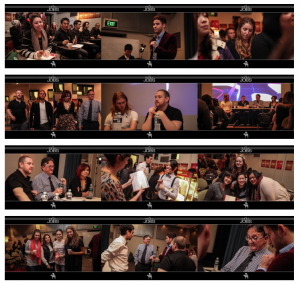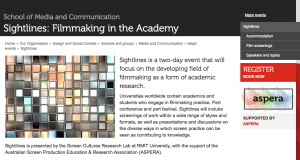Ms Ham said it was “more surreal than real” to have luminaries Kate Winslet, Liam Hemsworth and Judy Davis star in the film, which was filmed on location in Victoria and at Melbourne’s Docklands Studios last year.
“I haven’t found a metaphor that will express what it’s like,” she said.
“Actresses of the calibre of Kate Winslet and Judy Davis just affirm for me that the story I wrote is a story that deserves to be told, and told well.”
Set in the 1950s, The Dressmaker revolves around a glamorous woman, Tilly – played by Winslet – who returns to her small town in rural Australia after years refining her craft as an haute couture dressmaker in Paris.
With her sewing machine and haute couture style, Tilly transforms the women of the town.
Ms Ham said her upbringing in regional New South Wales and the tendency for locals to want to know everything about everyone had inspired her writing.
“My mother was a dressmaker in a small country town, and the idiosyncrasies of those two factors were the seed for the story,” she said.
Ms Ham began writing The Dressmaker in 1996 as part of her Advanced Diploma of Arts, Professional Writing and Editing (now Associate Degree in Professional Writing and Editing) at RMIT.
“The course taught me how to approach writing short stories and novels, and how to read well,” she said.
“Primarily, I learnt the craft of writing, not just the idealised image of what a writer does, and is.”
It has been a long journey from those formative years at university to now, and Ms Ham has been assisted throughout the film production process by renowned Australian film industry figure, School of Media and Communication Adjunct Professor Sue Maslin, a long-time friend.
The two in fact grew up in Jerilderie in regional New South Wales and went away to the same boarding school.
Adjunct Professor Maslin, The Dressmaker’s producer, was instantly drawn to story and said there was so much to love about it.
Of particular interest was the exciting imagery the couture costumes created, as they were completely at odds with small town rural Australia circa 1951.
But perhaps the most important element of the story was the strong leading female characters, which was the key to attracting two of the best actors in the world – Kate Winslet and Judy Davis – to the film.
Winslet receives around 200 scripts per year, from which she only chooses two or three to work on.
“We were overjoyed when she read the script and said yes,” Adjunct Professor Maslin said.
“It reinforced the fact that your story can’t just be a good idea; it has to be a really great idea and a great script.”
Adjunct Professor Maslin, who has also produced Japanese Story (starring Toni Collette) and executive produced Irresistible (starring Susan Sarandon) has enjoyed a career in Australian film that has spanned almost 30 years.
She got her start in media working as a producer on community radio in Canberra, before “stumbling upon a media degree”.
“It was one of those life-changing moments, where you find what you love,” she said.
“Film and media gives you an extraordinary licence to go into other worlds, and that is what has really kept me going all of these years.”
And as a producer, she said it was her job and greatest challenge to act as the guardian of emotion throughout the process.
“I love the challenge of protecting the emotion I felt when I first read the script or novel, right through the entire process over many, many years, so the audience member can go through that same experience as I did,” she said.
Adjunct Professor Maslin, who also teaches media, said the most important skill for media and communication graduates these days was to have a cross-platform understanding of how media works.
Graduates, she said, need to be able to migrate ideas across those platforms – such as cinema, television, games, online and e-books.
“As media consumers, we are constantly moving across media platforms,” she said.
“So we need to do the same as producers and reflect our audiences’ desires and needs.
“RMIT is much more responsive to real world media than a lot of the traditional film schools, who tend to still work on old models.”
Despite the doom and gloom around Australia’s film and media industry, Adjunct Professor Maslin said the future was bright and graduates from RMIT’s media and communication programs would still have exciting career prospects.
“We live in an era of media and communication, so there are incredible opportunities out there,” she said.
The Dressmaker is currently in post-production and is set for release in October.







